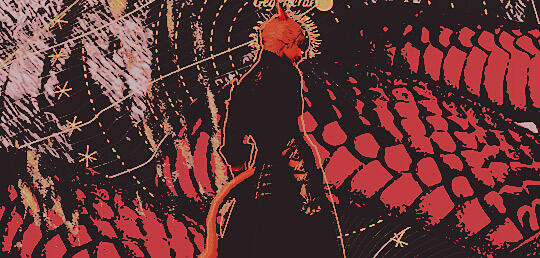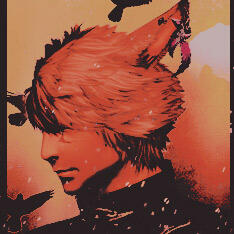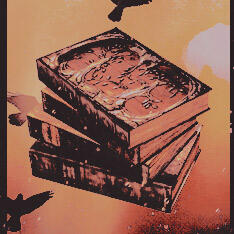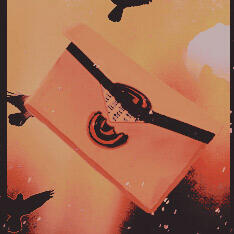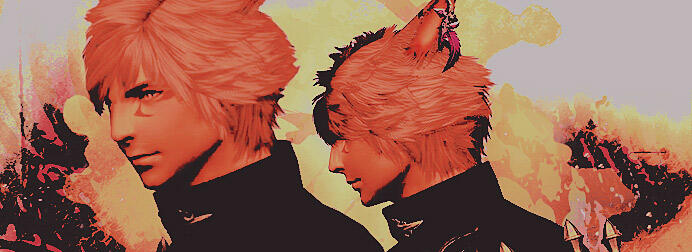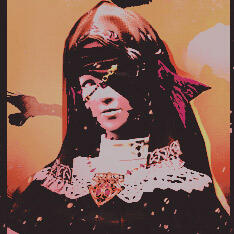FOUR.
it is excruciating to love a man who cannot help but forget himself.
(but he has never forgotten the path to back to you, no matter how far gone he is.)
PROFILE
full name: zv'iruh (zv-ee-ruh) furor. (zv'iruh is the last survivor of his clan and with hardly any memory of the culture and no intention on keeping the tribe alive, he easily cast off the tia/nunh last name conventions, but keeps the "zv" to honor his parents).
age: twenty-nine at the start of arr
gender: cis male
main class(es): scholar,
warriorsexuality: pansexual, male-leaning
current location: depends; owns a home in la noscea.
physicality: tanned skin of redder hues, with sharp pink eyes and ashy red hair, unkept and overgrown over one eye. sharp claws usually covered, sharp canines, and a long fluffed tail. uncommonly tall for a miqo'te, with various deep and ragged scars. normally wears form-fitting, colorless clothing that shows little skin to keep private the state of his roughly marked skin.
it's hard to tell if it's impassive or indifference, but later you come to know zv'iruh's stoney face is not for lack of feeling, not for apathy, but for the way emotions still come slow; delayed. he is straight-forward, good-natured, and subdued, though there is a heavy guilt to him, a fierceness when blows come to blows. he has integrated fine, but sometimes, there is still the sudden reactions, revealing with claws and fangs exposed, imposing and dark and taking too easily to destroying and hurting. for him, it is always about not falling back into old habits, and it will be a life of relearning -- but it is something he is committed to. it is the one thing he will be committed to, too, his only close companion his found family, while everyone else are at his polite, sharp distance. quickly, he can fall into bodily pleasures, but just as quickly he can turn someone away, cut them off just fine. emotions are hard, trust is harder, and there are too many things he fears. most of the time though, you will come to know him as gentle. most of the time though, you will come to know him as someone who listens well, who is polite and not over-bearing, who fidgets and doesn't sleep often and doesn't take care of himself too great, who smiles but as if he hasn't smiled much, before.
| age | main location | description |
|---|---|---|
| 0-9 y/o | ala mhigo | raised under his father and mother in a small, isolated seeker tribe. |
| 9-17 y/o | garlean empire | inducted into the garlean army as a child soldier. |
| 17-24 y/o | la noscea | defected, took sarnai under his wing, and found an occupation in limsa. |
| 24-29 y/o | la noscea | trained under the arcanist guild with sarnai and became a healer. |
| 29-34~ y/o | various | msq events except he remained a scion while sarnai became the wol. |
BACKSTORY
Zv’iruh does not know much of his tribe’s origins, nor why his father chose exile even in its infamy. Instead, Zv’iruh remembers the medicinal teas his mother would make, bitter to the tongue, and her laugher, bright and warm as he tried to taste it. She had told him that it would take some getting older to get used to to the taste, as well as even need it, the feather fall of her dark hair curled against her shoulders.
Her laughter was enough to fill a room, but also to fill your insides, to make your very veins pulse with what seemed like gold. It helped ease the tenseness of Zv’iruh’s father, who lived in the breath before rebellion and occupation, the stress of the mad king touching them even on the outreaches of Ala Mhigo.
Still, at the very least, they like many others at the time were self-sufficient, Zv’iruh having spent many mornings hands threaded in wool, or bending down to keep his mother company as she tended to crops. His father, dark skinned with the sun shining copper on his head, would come from mercenary work in late afternoons or even evenings, days later, and Zv’iruh’s mother would chide him for wounds, scars pink and gathering.
“One day,” Zv’iruh’s father had said on one of those evenings, still smelling of mother’s fresh poultice, “yer gonna set out on yer own too, Zv’iruh. There’s nothing 'ere to take over, regardless, but I promise, you’ll always have somewhere t'return to.” And he had taken his large hand and slid his palm over Zv’iruh’s head, gentle over Zv’iruh’s flattened ears, and Zv’iruh had always wondered as to the way that even though his father was so heavily built, he looked so fragile, then, like even the wind could blow him away.
There are other things Zv’iruh remembers, but they scatter, fainter — his parents pressing shoulders together, tails intertwined, his stumbling as he tried to lift the wooden sword his father had fashioned for him, blisters on his palms, sleeping underneath puffs of fleece until his mother called him to come home, the sun peeking over mountains, a friend, hand slippery in his.
Then, all too quickly, the Ala Mhigans rose up in rebellion, the anarchy the first taste of freedom after so much fear, and then, quicker, the Garlean invasion that swept through and took everything — Zv’iruh’s father, who had stayed too long to protect others, and Zv’iruh’s mother, whose grip Zv’iruh had lost in the chaos.
Feral, hair tangled and risen, blood still wet on his skin, Zv’iruh looked up at a Garlean officer, who smiled, albeit in a cruel and uncaring way. Zv’iruh could die there, he had said, alone with nothing to return to, or Zv’iruh had the choice to survive if he came with him. Zv’iruh, just barely nine, saw the outstretched hand and clutched desperately, unaware of the shackle he had put there, himself.
With the Garleans, the rules had to change. Rules had never been a strict thing in the first place, all of them just a bit flexible, Zv’iruh’s mother’s smile curled in one corner, amused, shaking her head — but the slightest disobedience was punished, there, the first marker of unexpected violence.
Zv’iruh had never been one for worship, either, his parents kneeling, whispering to Rhalgr, while his own hands clasped clumsily as he looked onto them, eyes wide. But it was a nightly routine regardless, speaking to something outside of himself in curiosity and awe, and that too was disallowed, the only religion allowed was reverence of your strength, of obedience to your superior officer; loyalty and use. The dedication to strength was a familiar thing, but it was all distorted, filled with contempt and repercussions and punishments, with coming out of your superior’s office unharmed the best reward.
Zv’iruh learned of primals, of beastmen, learned just as quickly to hate them and demean them. Family shifted into commanding officer, his commanding officer, and the commanding officer after that, the recruits that started with Zv'iruh shifting and being lost too quickly to gain even the slightest attachment. The ones that remained were competitive, desperate for acknowledgement, blinded by the ideas of citizenship and easily lashing out to gain power from their reverence of superiors.
Home was supposed to be with the Garleans, now, but the Garleans didn’t want you to consider them home, either.
Zv’iruh missed home. Craved his mother’s singing, of laying his head in her lap as she rubbed her hand against his back, missed even the bruises he got from training with his father. He cried at night until that was weaned out of him, too, few things ever afforded. As a Garlean, you were supposed to forget everything you were before, after all.
Training had been different than he was used to, less for survival and protection than to the purpose of subduing and killing. While a mistake once had been met with a gentle smile and the ushering of attempting it once again, a mistake now was met with distaste, reprimanding, or worse. Zv’iruh became an expendable soldier among many, his memories and culture being slowly carved out of him, with the only thing he was allowed to keep his name.
As if by design, the memories of his parents became more distant the longer Zv’iruh stayed in the army, scraped away by restless sleep, by orders, by the cruelty of the culture itself. All Zv’iruh knew was violence and turmoil, of the suffocating way all of them would just pick a person in power to believe in. If they could believe in that person's vision, then everything else didn't seem so bad, because what they were doing had purpose -- it was for the good of all.
Despite this, after Zv’iruh’s first kill, he spent many evenings still imagining the way axe sank into flesh, bile collecting in his mouth and forcing himself to swallow it down. He could still see the man’s face, looking at him accusatory but also pained. Over and over, the axe would sink into flesh, the victim a haunting phantom, but after Zv’iruh killed more, those dreams started to fade into a sobering, cold acceptance. It just became all he knew, and then further, something he prided himself on. Something he was good at and awarded for, for once, his superior's smile making something quiver inside him.
Into late adolescence, the few Zv’iruh that grew up with and still remained reached out in feverish touches, comforted by flesh and closeness and pleasure and speaking of love, though none of them truly knew of it. Love was dangerous in the face of being expendable, of conscripts raised to be of use. Still, they spoke of citizenship. Still, Zv’iruh’s axe started to weigh heavy, without him noticing. Still, Zv’iruh would wake, the bitterness of tea on his tongue, wondering as to how it got there.
Eight years into being with the Garleans, Zv’iruh was taken to Ala Mhigo once again, though he could hardly remember it as it was. It was there his fellow legion and a few other troops were delighted to come across a ship whose purpose was lost on Zv’iruh, who hadn't bothered to ask. Instead, it came as no surprise that all the loot was taken, and all the crews’ lives taken, as well. With no orders, they often caved into instincts, of brutality learned through brutality. Zv’iruh himself only saw something bright and wondered if even that inconsequential treasure might be a worthy gift to bring back with him.
But the crying and screaming turned shrill, and light, and it had been a mistake then for Zv’iruh to have looked for the source of the noise: a child, no more than nine, eyes desperate and pleading and wet and broken. He was offered a choice yet again, though the pale, indifference of his mind was barely able to see it.
Zv’iruh had been trained to look away, to watch, to participate. Had been trained and beaten into thinking not for himself but for the future of the Empire, until he was unsure of right or wrong unless it was told to him. Now, though, there was a roaring in his ears as he looked onto all the dead men on the deck, watched as his allies full and warm-bellied with delight at the carnage toyed with the child and her future, because they could and mostly because they wanted to.
The treasures in his pockets suddenly felt soggy and tainted, like the blood had touched his own hands somehow, with the roaring only growing louder, the smell of viscera overpowering, and oh something rose in him, something uncontrollable, desensitized and distorted as he was — none of them were prepared to meet resistance. Zv’iruh pulled out his axe and before most of them knew what was happening, multiple were already dead and were about to die, gazes still stuck in shock, even in death.
Fierce and bloodstained and having a hard time letting go of his axe, Zv’iruh heaved one, sagging breath, his lungs burning as he took off his mask. There, he looked down at the child, who was of a race that he was not very familiar with, scaled and small and cheeks still splotchy. What had he done? He did not know how to live or make decisions without someone to order him, did not know what it was like anymore to know freedom. Yet, still, he put his axe onto his back and outstretched a hand for her take, no matter how soaked in blood it was.
Zv'iruh learned in split seconds he did not know how to live -- did not know how to integrate into society, to mold himself back into a place along Eorzans, not Garleans, to not look down at others with an axe raised and lips pulled back in a snarl. They were always his enemy, and yet now he had to live alongside them, with a child's hand in his, looking up at him for direction. It was blind leading the blind, child leading child, and Zv'iruh stumbled constantly.
He had been told the Garleans were doing the right thing for so long, but it was through traveling he saw the wreckage they created. It was through Eorzean kindness and generosity that it finally sunk into him that what he had done was nothing more than cruelty, vile and inexcusable, and the Eorzeans were not beneath him, were not meant to be taken and reimagined better in Garlean form but instead people, just like him.
Zv'iruh and the child he saved lived off of those strangers as they kept moving forward, as Zv'iruh stumbled trying to find somewhere they could stay permanently. He could have easily fell into harsh mercenary work, used to a life of violence and lacking empathy for the loss of life, but the child was his charge, now, for better or for worse, and he could not leave her behind.
He might've, at certain points, the strange surge in him to save her seeming as distant and out of reach as holding onto any connections or bonds. But she would look to him, his name gentle in her mouth, him being her whole world, and there was something he did remember -- standing in the ruins of Ala Mhigo, still calling his mother's name, mouth coated in ash -- and so he didn't let her go.
Zv’iruh continued to desperately tried to find a place for them to live, somewhere stable, something like a home — and when the sailors in Limsa Lominsa finally told him they needed an extra strong set of hands to work, he quickly settled them down in La Noscea, where he clumsily put himself to shipbuilding and fishing. He was no good at it for a long time, easily irritable and frightened, always on guard, but the sailors were somehow tolerant, patient, teaching him and coaxing him into their way of life. He was not perfect, confused by social cues as they chuckled and joked and slapped him on the back with no harm involved, only joy, and... Zv'iruh found himself unwinding, just a little.
The girl, Sarnai, Zv’iruh later learned, seemed to grow quickly. She was bright and forgiving and had more to teach him than he, her, for he had to unlearn old trained habits, had to stop waking up in the middle of the night, eyes full with terror, hands shaking, had to stop reaching for his axe at any sudden sound. Sarnai settled him. She told him of her home, of the Xaela, of a warmth Zv’iruh thought he had long thought he had distanced himself from and forgotten, and eventually he opened up too, hurts sharing hurts.
On the worst nights, dark, full of blood and moaning and guilt, breath haggard as he craved death, eyes burning but unable to cry, he would try to remember the way Sarnai looked at him, the way to her his hands still seemed clean. In this, his breath would regulate, some, his heart beat a thrum in his ears, and he would remember that he already resolved to not leave Sarnai behind, who still was just a child. It was taking care of her that allowed him to move forward.
Sarnai and Zv’iruh had been together for seven years when the calamity happened. In the wake of it, many things had to change, but most of all they needed the strength to fight. Zv’iruh knew how to fight well, strength never a question, but putting his hands back on his axe brought him back to the life he had been working so hard to unmake. There was only so much he could change, and the axe was a reminder, a pull, like a siren that would be bring him all the way to the start — to the way his axe burrowed into flesh, a satisfying sink, of all the carnage he craved to create that made him hate himself the more he knew of its wrongness.
Sarnai saw this conflict, saw the shaking of his clenches fists, and suggested finding another way. This led him to the arcanist guild, a profession, he later learned, that could lead him into healing — and it was there he gained the hope that he might have a second chance at life.
Coming home to Sarnai, he spoke to her the hope of learning the profession together. Between them, magic came easier to her than it did he, for he was built for strength, for being close-up and bloodied and cruel, and she had known only this — but she always remained patient, as was her nature, and they both learned a new way of fighting at a steady pace.
Sarnai took to more combative magics, and Zv’iruh was satisfied in his supportive role, watching her grow and realizing, fully, that she was his family, something true to the word.
In the years that were to come, Zv’iruh and Sarnai ended up encountering Y’shtola and being inducted into the scions. Zv’iruh ended up watching Sarnai become a hero, out of reach of everyone else, but as how they always had been, he tried to shield her from the burdens of it. As alone as walking the life of the hero seemed, he didn’t want her to forget she had a home to return to. He was, in his own way, offering the words of his father back to her, and now he finally understood why his father then had been so fragile.
CONTACT
ign: zv'iruh furor@mateus
discord: all time nap time#0550
timezone: pst (gmt-8)
both mun and muse are 21+
heyyo im sasha and i got infected by the cat boy brain rot. i'm new to the rpc in ffxiv, but i've been rping on forums for a while. still a little uncomfortable rping in game because i'm on ps4 and i make typos very easily on my wireless keyboard, but i am up to it! don't be afraid to hmu with a /tell or discord message, would love to plot something for the future. if you're looking for me, i'm probably hanging out in uldah or at my fc estate. take care!
BONDS
SARNAI KAHKOL.
a child that is now grown, sarnai has become makeshift family for zv'iruh, what he may call a little sister. she is the one closest to him, and it is with her he unwinds the most, the creases and tightness of his face and posture relaxing. if it were to save her, he would even pick up his axe again, no matter how much it would pull him apart.
plot with me to be added here!
trivia
tbe.
drabbles
Zv’iruh feels an apology like broken shards in his mouth, cutting the insides of his cheeks, caught quick in the lines of his fangs, stuck like food left behind, but hurting.
He’s still reeling, ears ringing, can still feel the weight of Sarnai’s fingers tentatively on him even though it’s now gone, like a live wire, open and hot and burning. Once, hands had pressed neatly onto his cheeks, coaxing his fears away. Calloused and warm, palms cupping the small of his face, he could trust the gesture, the spark of his eyes bright — and later, he might realize that Sarnai’s hands are tiny, and fragile, and smoother than the sea at daybreak, but all he can see now is the cavity in him violence has wrought.
Teeth still bared, claws extended, he finishes the heave of his breath the same time he looks into her eyes and sees the reflection of him, there, imposing and casting a large shadow in his rage, anguish and fear. A second more, he might’ve slashed through her fingers, a breath more, he might’ve gripped her wrist so tight he could’ve felt the bones there break. “I’m sorry— ” he says as she looks onto him, voice hoarse and ragged and breaking, “I’m sorry,” he says again, because he could see the remnants of her fear, too, his promised, practiced violence always a shared and sobering reminder of that ship, still smelling of blood.
His hands only stop violently shaking minutes, maybe hours later, when Sarnai reaches out, and this time, he’s ready to let her.
It had been a slip up, a tantalizing enticement and curiosity that had his hands reaching out, claws half-extended, fangs scraping lightly over trembling skin. Half-marvel, half-new, Zv’iruh chuckled deep in amusement — “I love you,” the Hyur had said, fingers tangled in Zv’iruh’s hair, and they both knew he hadn’t meant it.
Yet still, Zv’iruh opened up his mouth to say, “I love you too,” back to him, eyes shimmering, and they both had laughed a little louder, an inside joke just for them in between the sweat and twisted limbs and the way Zv’iruh’s hair stood on end, raised in new pleasure. It was supposed to be the silver lining — the tiny sliver of a lifeline, offered to him in place of all the things Zv’iruh couldn’t be allowed, so he was ready to swallow it all up, the taste of salt on his tongue and lips still swollen.
And after the first time, with all the times that came after, Zv’iruh pulled more from his recipients, demanded more and more of the heat whether or not it was his sweat or theirs, mingled too much to take notice, slick and wet and just enough to live on the edge of delirium, to know nothing but the present moment.
It did not matter if the marks would heal over time; it did not matter if they hurt, now. Zv’iruh could claim something for his own, and sometimes, he was that something for someone else — it wasn’t love, but it was close. It was close enough.
“Zv’iruh, let it go.” Zv’iruh’s father’s smile is lopsided, lip broken, leaning his weight to one side. He’s injured, beaten down, and there are scratch marks like gauges in his skin — but Zv’iruh opens his mouth and his father just shakes his head, resigned, accepting. “As long as we’re all safe,” Zv’iruh’s father adds, and Zv’iruh swallows the lump in his throat, wishes he could grow and grow to be as big as his father, bigger even, so he’d have the strength to protect them both. Instead, his claws are pinpricks in his palms.
Instead, he nods, tailing after his father, and absolves to let it go.
“Do you have something to say recruit?” Zv’iruh peers up to only see his superior’s boots from his position on the ground, new pains already aching.
Zv’iruh knows better to not say something again, so he keeps his forehead pressed to the ground, ears pulled back, frown masked by the way his lips kiss the floor beneath him. His superior laughs. “I thought so,” they say, and Zv’iruh feels the rising rage at the humiliation, feels it burn its way all the way through his skin to sear into his bones, but he stays silent.
Let it go, Zv’iruh reminds himself, just let it go.
Zv’iruh stands in front of the fallen body of a fellow conscript, expression wobbling, and his companion, Yue, grabs at his arm, looks up at him with an appeal in her eyes. “They died for a good cause, Zv’iruh,” she tells him, and Zv’iruh’s expression only gets more twisted, the lines of his face deepening in pain. “There’s no point in mourning them. Honor them instead.”
Zv’iruh turns to her, and she’s smiling, as if the blood hasn’t stained her uniform, too. “Let it go,” she says, and a cavity opens up wide in him, emptying out all the rage at injustice until —
“You don’t often see Xaela this far away from the Steppe,” a soldier says, an uncomfortable glint to his eye, and Zv’iruh turns towards the commotion, looking through the carnage to the child soaked in blood. “What kind of price do you think we’ll get from her?”
And when they laugh, the rage rises again to its boiling point. Let it go, an old voice says, cloaking its hands over Zv’iruh’s eyes, but he’s so tired of letting it go.
So he picks up his axe, and swings.
